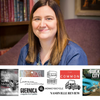From Blank Page to Published Author
Start Writing Today
Real Writers. Real Guidance. Real Results Since 2016.
Real Writers. Real Guidance. Real Results Since 2016.
Your Writing Journey Starts Now!
How to Make 2026 Your Best Writing Year Yet: Manifest Your Writing Goals Zoom Seminar with Courtney Kocak on Sunday, December 28th, 2025


How to Make 2026 Your Best Writing Year Yet: Manifest Your Writing Goals Zoom Seminar with Courtney Kocak on Sunday, December 28th, 2025
Write 30 Poems in 30 Days 4-Week Online Workshop with Sarah Carson Starts Thursday, January 1st, 2026


Write 30 Poems in 30 Days 4-Week Online Workshop with Sarah Carson Starts Thursday, January 1st, 2026
Write Your Nonfiction Book in a Year: Complete Manuscript & Proposal Incubator with Melissa Petro starts on January 15th, 2026


Write Your Nonfiction Book in a Year: Complete Manuscript & Proposal Incubator with Melissa Petro starts on January 15th, 2026
Year-Long Novel Incubator: Transform Your Early Draft Into a Polished, Publication-Ready Novel with Joss Lake starts on January 6th, 2026


Year-Long Novel Incubator: Transform Your Early Draft Into a Polished, Publication-Ready Novel with Joss Lake starts on January 6th, 2026


